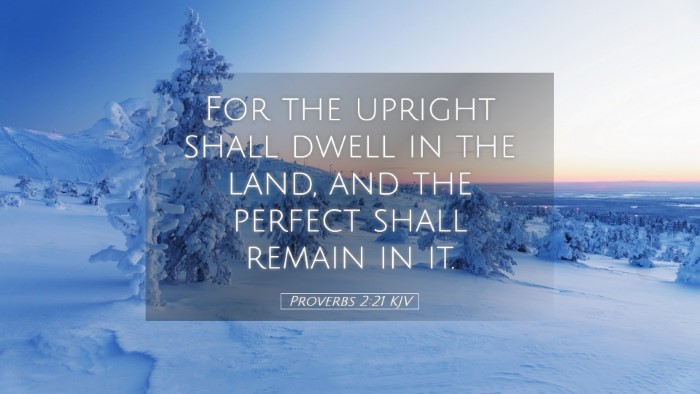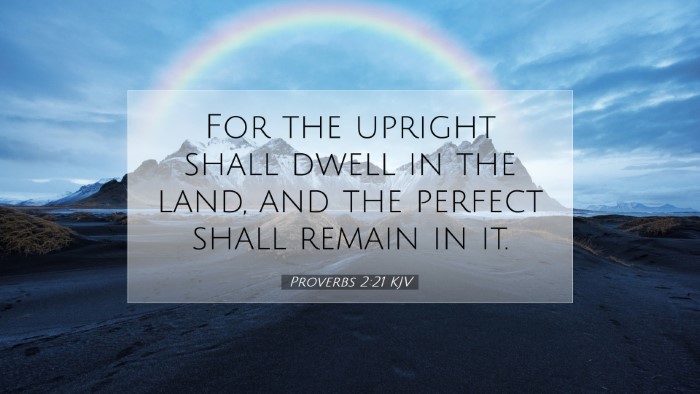Commentary on Proverbs 2:21
Verse: "For the upright will inhabit the land, and those with integrity will remain in it."
Introduction
This verse from the book of Proverbs emphasizes the stark contrast between those who walk in righteousness and those who do not. It illustrates the fate of the upright, their reward for living with integrity, and serves as a powerful reminder of the importance of moral conduct in light of divine justice.
Insights from Matthew Henry
Matthew Henry appropriately outlines the significance of the upright. He notes that the 'upright' are those who are in right standing with God due to their faith and good works. According to Henry, their dwelling in the land symbolizes spiritual and physical blessings, reflecting God’s promise to reward those who diligently seek after righteousness.
- Security and Stability: Henry points out that the upright will possess a stable life, characterized by peace and stability, unlike the wicked who are unstable.
- Inheritance of the Land: The land signifies not just physical land but also the blessings and privileges one has by being in a covenant relationship with God.
Insights from Albert Barnes
Albert Barnes adds a theological nuance to this verse that aligns moral integrity with divine providence. He elaborates that the inhabitants of the land are those who are righteous, and underscores the provision and guidance they receive from God, while the verse reiterates a promised stability in their lives.
- God’s Favor: Barnes emphasizes that living a life of integrity aligns oneself with God’s will, thereby attracting His favor which leads to dwelling securely in His blessings.
- Differentiation from the Wicked: He makes it clear that this promise is not extended to the wicked, who will find themselves uprooted and displaced.
Insights from Adam Clarke
Adam Clarke offers a broader perspective by examining the societal implications of righteousness. He notes that when a society is filled with upright individuals, the land flourishes, benefiting all. Clarke connects moral conduct with socio-economic stability, suggesting that when God’s laws govern, the entire community thrives.
- Moral Foundation: Clarke argues that the upright form the moral bedrock of society, enabling it to prosper legitimately and harmoniously.
- Remnant of Integrity in Adversity: He suggests that in times of great moral decline, the remnant of the upright will sustain and uphold the truth even in adversity.
Theological Implications
The passage resonates with profound theological truths. It reflects the concept of divine governance where righteousness is rewarded and wickedness leads to destruction. This has implications for pastoral teaching, leadership, and the ethical framework within which both individuals and societies operate.
- Righteousness as a Foundation: This verse serves to encourage believers that their pursuit of righteousness is not in vain, but rather foundational for both earthly and heavenly rewards.
- Call to Integrity: Pastors and church leaders can use this as a call to uphold integrity and uprightness in their congregations, reminding them of the long-term benefits that come with faithful living.
Practical Applications
For students and scholars, Proverbs 2:21 poses questions regarding one's personal moral compass. It invites scholarly inquiry into what it means to be 'upright' in contemporary contexts, and how biblical principles can be practically integrated into daily life.
- Examination of Personal Conduct: Individuals are urged to evaluate their lives against the standards of uprightness as described in scripture.
- Community Engagement: Scholars are encouraged to engage in discussions about how integrity affects community dynamics, social justice, and public morality.
Conclusion
In summary, Proverbs 2:21 provides timeless wisdom on the rewards of upright living. It serves as both a promise of blessing for the righteous and a warning against the fate of the wicked, encouraging believers to pursue a life of integrity. As pastoral leaders, students, and theologians reflect on this verse, they are invited to explore its depth and application in both spiritual and practical dimensions of life.


